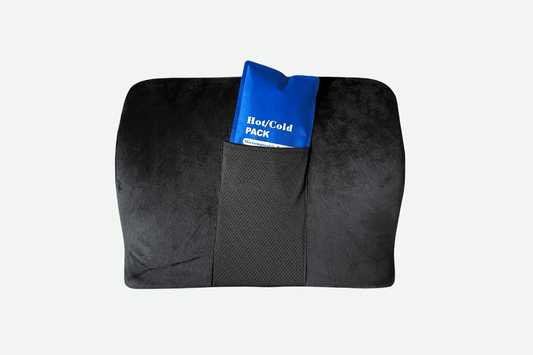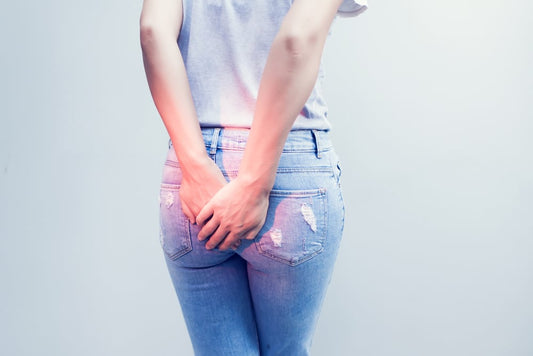Healing Benefits of Postpartum Sitz Baths
Robert Cutler, D.O., FAOCPrShare
With a new baby on your hands, the last thing you want holding you back after childbirth is lingering pain. Following nine months of pregnancy and then labor, however, anal and vaginal discomfort is practically a given. What’s the solution? Postpartum sitz baths offer a simple, gentle option for addressing the sensitive needs of these areas as they heal.
What is a Sitz Bath?
The town of Malvern, England was famous for its healing waters throughout the 17th and 18th century, drawing people from all over the world to its wells and springs. The Malvern Water Cure refers to a number of hydrotherapy clinics set up in Malvern, and the sitz bath (after the German verb sitzen, to sit) was invented as part of this healing regimen. The sitz bath in particular proved highly effective and spread in popularity outside of the clinics, cementing its place in modern postpartum health and postpartum recovery.
Physical Healing Benefits of Using a Sitz Bath Postpartum
The labor may be over, but your anal, perineal and genital area are still working overtime in the days and weeks after childbirth. Whether you have stitches, slight tears, hemorrhoids or cramping, sitz baths relieve a number of different physical aspects of postpartum care. Wondering when can I take a bath after birth? You should wait at least 24 hours before taking your first sitz bath after delivery.
Relieves Perineal Pain and Discomfort
Your perineum, the area of tissue and muscle separating your vaginal opening and your anus, is susceptible to tearing during labor and may be particularly sore after giving birth. While the perineum is designed to stretch, the acute pressure of the baby’s head against the vaginal opening during delivery impacts the perineal zone, leaving it swollen. An after birth sitz bath will increase circulation and promote blood flow to the affected area, helping to disperse the swelling.
Promotes Healing of Tears or Episiotomies
Due to excessive stretching during labor, your perineal and anal regions are both vulnerable to small or even larger tears. As with episiotomies, these tears may require stitches, making it difficult to walk, stand, urinate or pass a bowel movement without pain or the fear of reopening the wound. Attempting to avoid stitches or tearing can also make it harder to keep the area clean at a time when it is especially prone to infection. The warm water of a post partum sitz bath keeps the stitches clean as they heal, and the resulting bump up in blood flow means increased oxygen and immune cells for faster healing.
Helps to Reduce Swelling and Inflammation
During pregnancy, it’s natural for hormones to cause your body to create and retain excess fluid, which will then begin to drain in the weeks following delivery. Combine this with the swollen, tender and often bruised skin that comes with childbirth, and your body is in desperate need for some anti-inflammatory TLC. A sitz bath after birth does just this, stimulating circulation and helping to relieve pressure, encourage blood flow and detox, and reduce pain.
Aids in the Healing of Hemorrhoids
Increased pressure on the rectum is a main culprit for developing hemorrhoids, so it’s no surprise that they tend to play a huge part in postpartum discomfort. Add to that the constipation many women experience while their body rebalances post-labor and the pushing of labor itself, and you practically have a guarantee for postpartum hemorrhoids on your hands. Sitz baths directly target the swollen veins causing the hemorrhoid symptoms. Warm water signals blood flow back to the anal tissue and reduces muscle spasms, relaxing the muscles of your anal sphincter in turn.
Emotional Healing Benefits of Using a Sitz Bath Postpartum
As we discussed above, sitz baths were originally developed as part of a larger therapeutic regimen to help address physical and emotional wellbeing. A postpartum sitz bath distills the central tenet of hydrotherapy (in which the physical properties of water – temperature, pressure, buoyancy, viscosity, conductivity – are used to relieve pain and encourage relaxation) into its most straightforward, simple-to-manage form. Read on to discover the range of emotional benefits offered by this postpartum practice.
Helps to Relieve Stress and Anxiety
Postpartum sitz baths are shallow for a reason. The 2 to 3 inches of warm water covering just above your vaginal area intentionally draws blood flow to the region, increasing cardiac output and decreasing heart rate. What does this mean for stress and anxiety? Both tend to set off your body’s flight or fight response, raising your heart rate and tensing your muscles. The soothing effects of a sitz bath thus work against such symptoms, preventing tension and encouraging circulation as a means to keep your body calm.
What You’ll Need
The best part about sitz baths is how little you need to start using them. While most drug stores sell a sitz bath kit that includes a plastic basin to fit over your toilet, you can simply use a bathtub that has been properly cleaned. If you don’t have access to hot or clean water from a tap, you can boil hot water and wait until it cools to a manageable temperature. For an extra boost try adding Doctor Butler’s Postpartum Soothing Bath Salts or our hemorrhoid focused Doctor Butler’s Epsom Salt which pairs salt with plant botanicals geared specifically toward an anti-inflammatory and analgesic soak.
Step-by-Step Instructions
- Using water that is warm but not scalding, fill up your tub or basin with enough water to cover your entire perineum (typically three to five inches).
- If adding salt or products of any kind, place them in the water now.
- Gently lower yourself into the tub or basin so that your perineum is completely submerged, with knees bent or dangling over the tub and up out of the water.
- Soak for 10 to 20 minutes as needed.
- Carefully removing yourself from the water, make sure you pat the area completely dry (taking care not to rub).
Sitz Bath Postpartum: Precautions and Considerations
While sitz baths are typically thought to have very limited drawbacks, it’s important to stay observant for signs of a negative reaction.
- Symptoms of infection include redness, swelling or pus that was not present prior to incorporating sitz baths.
- Those with stitches following an episiotomy or significant tearing should be weary of excessive soaking, as too much water may cause the stitches to disintegrate prematurely.
- Bathtubs used for sitz baths should be thoroughly scrubbed beforehand to minimize the risk of bacterial contamination.
- Towels to pat dry should be freshly washed and free of germs or shared use. Be weary of detergents that are scented or include harsh chemicals.
Better Postpartum Recovery With Doctor Butler’s
With so much going on after the arrival of a new baby, it’s important to find effective, easy solutions for making sure your postpartum healing is on track. Postpartum sitz baths are a no-cost option for adding a boost to the health, hygiene and well being of your perineum and beyond. Check out this list of postpartum must haves for additional ways to get you back on your feet and feeling good.
At Doctor Butler’s, we’re professionals in all things ‘down-there care’ for you and your newborn. We have a postpartum spray for perineal tears and hemorrhoids, and a diaper rash cream for your baby. Get in touch with us through our Contact page if you have any questions on what’s right for you in this sensitive period.
And lastly, congratulations on the arrival of your new baby!


